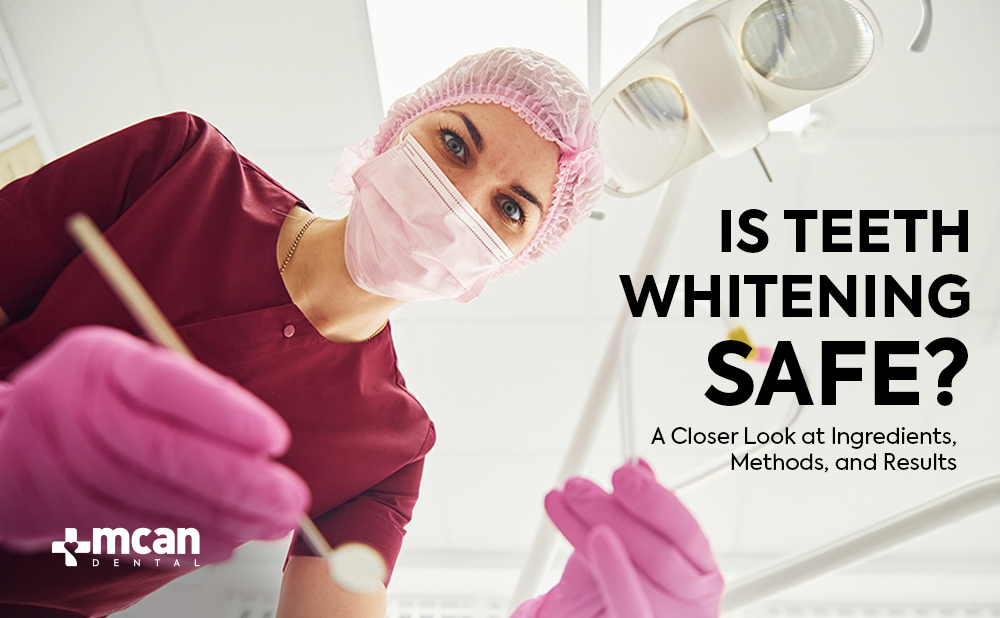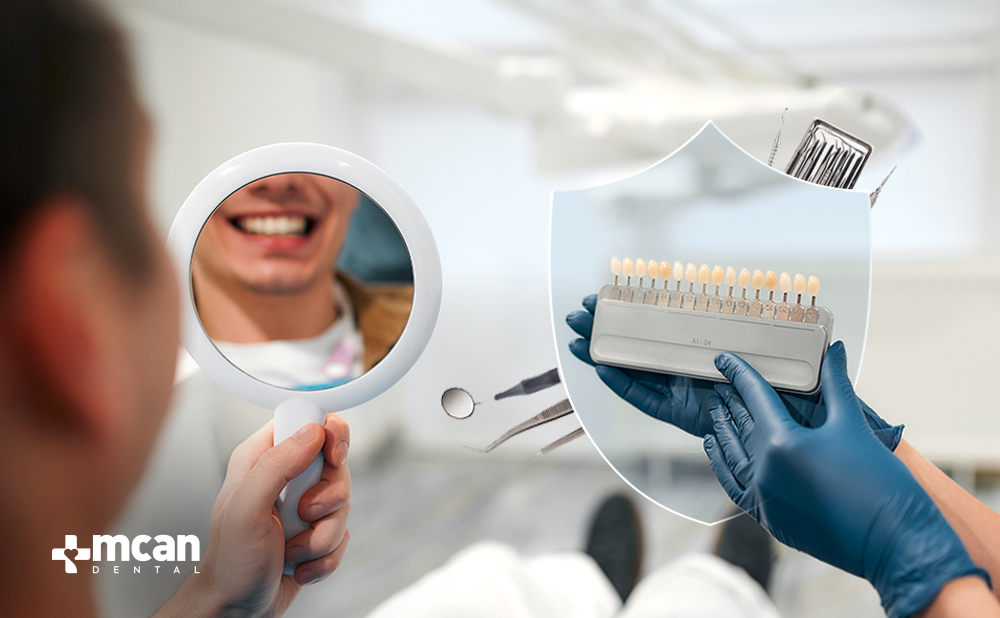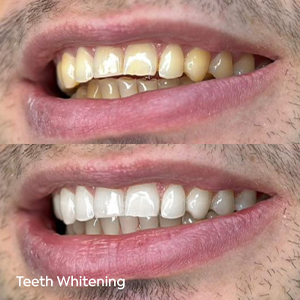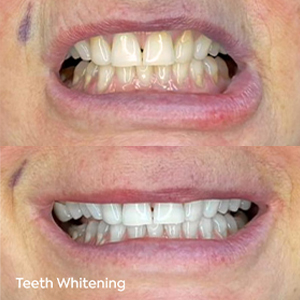
A brighter smile is often seen as a symbol of health and confidence, which explains why teeth whitening remains one of the most popular cosmetic dental treatments worldwide. However, as demand grows, so do questions about its safety. With conflicting advice circulating on the internet, many patients hesitate, unsure if professional whitening might harm their teeth or gums.
This article aims to cut through the confusion and provide clear answers. We’ll explain what makes professional teeth whitening safe when done under dental supervision, highlight the most common concerns, like enamel damage or tooth sensitivity, and compare clinical treatments with over-the-counter options.
What Makes Professional Teeth Whitening Safe?

Professional teeth whitening treatments are designed with both effectiveness and patient safety in mind. When administered by qualified dental professionals, these procedures follow strict protocols and use high-quality, controlled substances that minimize risks while maximizing results.
Here’s what contributes to the safety of professional whitening:
- Use of Clinically Approved Ingredients: Professional treatments typically use hydrogen peroxide or carbamide peroxide in concentrations that are both effective and safe for enamel and soft tissues when used properly. These agents penetrate the tooth’s surface to break down stains without compromising tooth structure.
- Customized Application: Unlike over-the-counter kits, professional whitening is tailored to each patient’s oral condition. Dentists use trays or direct application methods that avoid contact with sensitive gum areas, reducing the risk of irritation or chemical burns.
- Pre-Whitening Assessment: A comprehensive dental check-up is performed before treatment. Any existing issues like cavities, gum disease, or worn enamel are addressed to prevent discomfort and ensure the whitening process won’t exacerbate underlying problems.
- Supervised Procedures: Dentists monitor the process from start to finish, adjusting treatment time or strength as needed to suit individual tolerance and sensitivity levels.
- Post-Treatment Guidance: Patients receive tailored aftercare instructions to maintain results and avoid temporary sensitivity. This professional follow-up is key to both comfort and long-lasting outcomes.
Common Concerns About Teeth Whitening
It’s normal to have questions or concerns before undergoing a cosmetic dental procedure. Teeth whitening, though widely practiced, is often surrounded by misunderstandings that can cause unnecessary hesitation. Let’s address some of the most common concerns and explain what you can actually expect.
Will it damage my enamel?
This is one of the most common fears. When done professionally, whitening does not harm the enamel. Dentists use peroxide-based agents that penetrate the enamel to lift stains without eroding or thinning the tooth structure. However, excessive or unsupervised whitening at home may increase this risk.
Will my teeth become sensitive permanently?
Some patients may experience mild, temporary sensitivity after whitening, especially to cold food and drinks. This usually resolves within a few days. Dentists can use desensitizing gels or adjust the whitening formula to minimize discomfort, making the process suitable even for those with pre-existing sensitivity.
Are the chemicals used in whitening harmful?
Professional whitening products contain ingredients that are rigorously tested and approved for oral use. When applied properly, they are not harmful to your health. DIY kits, however, can pose a risk if they contain unregulated substances or are used improperly.
Will it whiten all of my teeth evenly?
Whitening affects natural teeth, but not crowns, fillings, or veneers. A professional will assess your dental history and existing restorations to ensure your whitening results appear uniform and natural.
Can I whiten my teeth too much?
Yes, overuse of whitening products, especially without supervision, can lead to enamel wear or irritation. That’s why it’s important to stick to a dentist-recommended schedule and avoid over-the-counter overuse.
Benefits of Professional Whitening vs. At-Home Methods
With so many teeth whitening products available online and in stores, it’s easy to wonder why you’d choose a professional treatment. While at-home methods offer convenience, they often fall short in terms of safety, precision, and results. Here’s how professional whitening stands apart:
| Feature | Professional Whitening | At-Home Whitening Methods |
|---|---|---|
| Results | Noticeable after 1 session, several shades lighter | Gradual results, often less dramatic |
| Customisation | Tailored to tooth shade and sensitivity | One-size-fits-all approach |
| Safety Measures | Gum protection and dentist supervision | Risk of gum irritation or enamel damage |
| Treatment Time | Typically under 1 hour | Requires daily use over weeks |
| Sensitivity Management | Desensitising agents and monitoring | Often leads to discomfort, especially for sensitive teeth |
| Oral Health Check | Pre-treatment exam to catch issues | No professional evaluation |
| Longevity of Results | Long-lasting with maintenance | May fade quickly |
| Cost | Higher upfront cost, better value over time | Lower cost but potentially less effective |
Who Should Avoid Whitening Treatments?
While professional teeth whitening is safe for most people, it’s not suitable for everyone. Certain dental conditions or individual circumstances can make the procedure less effective or potentially uncomfortable. It’s important to consult a dental professional before starting any whitening treatment to ensure it’s appropriate for your oral health.
Here are cases where whitening should be approached with caution or avoided altogether:
- Pregnant or Breastfeeding Individuals: Although there’s no conclusive evidence that whitening harms developing babies or infants, most professionals advise postponing elective procedures during pregnancy and breastfeeding for safety.
- Children and Teenagers: Whitening is generally not recommended for patients under the age of 16. Their teeth and gums are still developing, and whitening agents may be too harsh for younger enamel.
- Sensitive Teeth or Allergies: Those with a history of dental sensitivity or allergies to peroxide-based gels should consult their dentist about alternative treatments or lower-concentration products.
- Gum Disease or Tooth Decay: Whitening can worsen sensitivity and may irritate gum tissues if active disease is present. Any underlying dental issues should be treated before cosmetic procedures.
- Extensive Restorations: Whitening treatments do not change the color of crowns, veneers, fillings, or bridges. If these are prominently visible, results may appear uneven unless restorations are updated after whitening.
- Severely Discolored Teeth: Some types of deep, intrinsic staining, caused by medications or trauma, may not respond well to whitening. These cases may benefit more from veneers or crowns than bleaching.
Tips for Safe and Effective Whitening


To get the most out of your whitening treatment, while protecting your enamel and avoiding unnecessary discomfort, it’s essential to follow best practices recommended by dental professionals. Here’s how to safely brighten your smile:
- Always Consult a Dentist First: A professional evaluation helps identify any issues like cavities, gum disease, or sensitivity that may need attention before whitening. Your dentist can recommend the safest and most suitable approach for your needs.
- Opt for Custom Trays If Whitening at Home: Over-the-counter kits can lead to uneven results and gum irritation. Custom trays from a dentist provide better fit, comfort, and results by keeping the gel precisely where it’s needed.
- Use Products with Safe Concentration Levels: Choose gels that contain dentist-approved levels of hydrogen or carbamide peroxide. Stronger doesn’t always mean better, higher concentrations may increase sensitivity without improving effectiveness.
- Avoid Acidic Foods and Drinks After Whitening: After treatment, your teeth are temporarily more porous and vulnerable to staining. Stay away from coffee, wine, citrus, and other stain-causing foods for at least 48 hours post-treatment.
- Don’t Overuse Whitening Products: Using whitening treatments too frequently can erode enamel over time. Stick to the schedule advised by your dentist, and take breaks between sessions to allow your teeth to recover.
- Maintain Good Oral Hygiene: Brush and floss regularly to keep surface stains at bay and prolong the effects of whitening. Using whitening toothpaste a few times a week can help maintain brightness without causing abrasion.
Why Choose MCAN Dental for Safe Teeth Whitening in Turkey?

When it comes to professional teeth whitening, safety and effectiveness go hand in hand. At MCAN Dental, we prioritize both, offering scientifically backed treatments delivered by experienced professionals in a clinical environment that adheres to international health standards.
Our cosmetic dentistry team is equipped with the latest whitening technologies, including laser-assisted and in-office gel systems, designed to deliver noticeable yet safe results in a single session. Whether you’re visiting us for a full smile makeover or a subtle refresh, every treatment plan is customized to your oral health and aesthetic goals.
Why patients trust MCAN Dental for teeth whitening in Turkey:
- Professional Supervision: Whitening is always performed under expert care to minimize sensitivity and ensure optimal results.
- Personalized Treatment Plans: We assess your dental health before recommending the right approach for your needs.
- Top-Tier Technology: Our modern equipment ensures precise, consistent, and comfortable whitening experiences.
- International Standards: With a multilingual staff, centrally located clinic, and strict hygiene protocols, we cater to patients from around the world with confidence.
- Transparent Packages: Enjoy all-inclusive pricing with no hidden fees, ideal for international dental tourism.
If you’re looking for safe and effective teeth whitening in Turkey, MCAN Dental offers results you can trust in a clinic that puts your comfort and care first.
FAQs About the Safety of Professional Teeth Whitening
Is professional teeth whitening safe for everyone?
Yes, when performed under dental supervision, professional whitening is safe for most individuals. However, it may not be recommended for pregnant individuals, people with untreated cavities, or those with severe gum disease.
Can teeth whitening damage enamel?
No, professional whitening treatments use clinically approved gels that do not harm enamel. Dentists also assess your oral condition beforehand to ensure the treatment is safe for your teeth.
What’s the most common side effect of teeth whitening?
Temporary tooth sensitivity is the most reported side effect. It usually subsides within a few days after treatment and can be managed with sensitivity toothpaste or fluoride applications.
Are over-the-counter whitening kits less safe than in-office treatments?
Yes, they can be. Without proper dental assessment and guidance, these kits may be misused or over-applied, increasing the risk of gum irritation or enamel damage.
How often can I whiten my teeth safely?
Most patients can safely undergo professional whitening once a year, depending on lifestyle habits and oral health. Your dentist will recommend the best timeline based on your needs.
Does whitening affect dental restorations like crowns or veneers?
No, whitening agents do not change the color of crowns, veneers, or fillings. If these are visible in your smile line, your dentist may suggest replacement for a uniform appearance.
